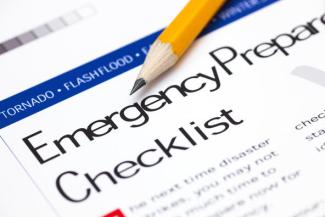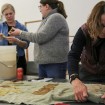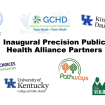UK Collaborates to Offer Disaster Preparedness Toolkit for Older Adults

Disasters can come in many forms, including flooding, tornadoes, hurricanes, wildfires and more. Eastern Kentucky was hit particularly hard earlier this year with flooding and winter storms. These events led community partners in the Kentucky River Area Development District and several centers at the University of Kentucky to collaborate on a disaster preparedness toolkit designed to better inform older adults should their region be affected.
“Our Appalachian residents can experience extreme hardship during these disasters,” said Erin Haynes, D.P.H., Kurt W. Deuschle Professor of Preventive Medicine and Environmental Health, chair of the UK Departments of Epidemiology & Preventive Medicine and Environmental Health, and deputy director of the UK Center for Appalachian Research in Environmental Sciences (UK-CARES). “This project utilizes combined expertise and resources from across the Commonwealth to help Kentuckians who are most at need when disaster strikes.”
“One in five people living in the Kentucky River Area Development District are age 65 or above,” said Melissa Slone, research interdisciplinary director at UK Center of Excellence in Rural Health and chair of the Kentucky River Health Consortium. “Increasing awareness about disaster preparedness for this demographic is essential for safety and wellbeing. We welcome other communities to access and share this toolkit.”
The Disaster Preparedness Toolkit for Older Adults is available on the Kentucky River Health Consortium webpage. The toolkit contains several handy documents including a disaster kit checklist, tools to document medical needs and health issues, a family communication plan, information on how to safeguard important documents and a brief video made especially for older adults. The toolkit is made possible by the Kentucky River Health Consortium Workgroup for Aging Populations, in partnership with the Kentucky River Area Development District, UK Center of Excellence in Rural Health, UK-CARES and Kentucky Homeplace.
“The collaboration that produced this toolkit is just one example of how community-academic partnerships can help improve our ability to take care of ourselves before during, and after disaster strikes,” said Anna Goodman Hoover, Ph.D., assistant professor in the College of Public Health and member of UK-CARES. “Such toolkits can be especially important in rural areas, where long distances and challenging conditions can slow response.”
“Being prepared and educated before disaster happens is important at any age, but it’s particularly important as was we get older,” said Stacie Noble, associate director of aging services at the Kentucky River Area Development District and chair of the aging populations workgroup of the Kentucky River Health Consortium. “Seniors may not be able to react as quickly to disaster situations or evacuation orders if they have a physical disability or limited mobility. Other issues like vision or hearing impairment or having a chronic illness may make it more challenging for seniors to deal with a disaster.”
Learn more about disaster preparedness at www.ready.gov.


